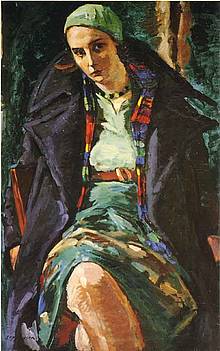Kassel Rocks.
/ I spent last weekend in Kassel, pretty much spang plumb in the middle of Germany.
I spent last weekend in Kassel, pretty much spang plumb in the middle of Germany.
Why Kassel? Well - for reasons I may explain later - I wanted to visit the town which the young Samuel Beckett visited so often. (Between the ages of 22 and 26, he made eight lengthy visits to Kassel.) Beckett went there to see his cousins, the Sinclairs, and in particular Peggy Sinclair. Peggy and Sammy (as the kids in the neighbourhood knew him - they thought he was American, or English) had one of the all-time great disastrous relationships. He writes very cruelly about Peggy in his first book, More Pricks Than Kicks, and very tenderly in one of his late plays, Krapp's Last Tape. That's blokes for you.
She died of TB in 1933, and the Sinclairs returned to Ireland. Beckett never returned to Kassel after Peggy's death.
Many years later, a doctor in Kassel, Gottfried Büttner, wrote, care of Beckett's publishers, to say how moved he had been by a performance of Happy Days. Beckett wrote back, mentioned his connection with, and affection for, Kassel, and asked about the city. Beckett had heard much of it had been destroyed in the war. (The RAF smashed Kassel then burnt it, using high explosives and incendiaries, in late October 1943. Ten thousand people, the vast majority civilians, died as the medieval city centre was consumed in a firestorm.) I have a great affection for the RAF (after all, my dad served in it, and his RAF medals are on display in my parents' house, right beside my great grandfather's IRA medals). But I do wish they hadn't deliberately burnt down quite so many cities full of civilians.
Anyway, Beckett asked Dr. Büttner to find out if the Sinclairs' old neighbourhood had survived (it had, being a few stops by tram away from the town centre... which reminds me of my favourite German word. Strassenbahnhaltestelle. It means... tramstop. And that is why German translations of English books are always 30% longer... Strassenbahnhaltestelle. For tramstop. Jesus.). They continued to correspond regularly for many years, and even met up a few times in Paris. Beckett said he could never go back to Kassel, too many memories.
A highlight of the trip was meeting the Samuel Beckett Gesellschaft (or, in English, SamSoc), and many of their friends. All together, an amazing bunch of people. Frau Büttner very kindly allowed me to visit her house, and see the portrait of Peggy Sinclair by Karl Leyhausen. (Leyhausen, unable to make a living as an artist in Kassel, went to Paris shortly after painting Peggy. Unable to make a living there either, he killed himself in 1931. He was 32 years old.) The photo of it here doesn't do it justice. A gorgeous, lively oil painting, it looks like it was painted last week. The scarf hops and pops in blocks of colour. You worry the paint might not be dry. But it's over eighty years old.
